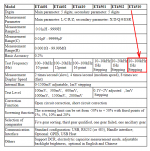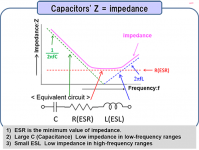I need a decent ESR tester for testing large PSU electrolytic capacitors - typically 15,000uF to 22,000uf in the 80V-120V range. I understand one such unit is the PEAK Atlas ESR+ model ESR70.
Are there any others that I should be looking at?
Stay safe.
Rgds
Mayank
Are there any others that I should be looking at?
Stay safe.
Rgds
Mayank
I deeply regret buying the Anatek Blue ESR tester. Its measurements are not repeatable and, compared to other gear I also own, its accuracy is poor.
I am pleased with the Peak Atlas and very pleased with the DER EE DE5000. If you decide to buy the latter, eBay has the best prices for brand new units. Search for a bundled deal including all the accessories, e.g., this listing
By the way, the extremely cheap Mega328 component tester ($9 on eBay) does output a number which it calls ESR. If you're in the field, desperate, and away from all other gear, it might be better than nothing at all.
I am pleased with the Peak Atlas and very pleased with the DER EE DE5000. If you decide to buy the latter, eBay has the best prices for brand new units. Search for a bundled deal including all the accessories, e.g., this listing
By the way, the extremely cheap Mega328 component tester ($9 on eBay) does output a number which it calls ESR. If you're in the field, desperate, and away from all other gear, it might be better than nothing at all.
DE-5000 but upper limit is 20mF. And then it starting to get costly, even Chinese made 4-wire like ET4401 ~$250+ LCR meter C up to 99mF (max 10kHz 10points) $350+ up to 99mF (max 10kHz 1Hz step) $450+ up to 999mF (max 100kHz 1Hz step) ET4510I need a decent ESR tester for testing large PSU electrolytic capacitors - typically 15,000uF to 22,000uf in the 80V-120V range. I understand one such unit is the PEAK Atlas ESR+ model ESR70.
Are there any others that I should be looking at?
Stay safe.
Rgds
Mayank
Thank you Mark and Garrbage for your recommendations.
I already do have the cheap Mega328. The DE5000 looks a bit complicated to use, so perhaps I should go with the Peak Atlas for now. It also just happens that Newark is running a 15% off on its listed price of $90.63.
Thanks once again.
Rgds
Mayank
I already do have the cheap Mega328. The DE5000 looks a bit complicated to use, so perhaps I should go with the Peak Atlas for now. It also just happens that Newark is running a 15% off on its listed price of $90.63.
Thanks once again.
Rgds
Mayank
check out post #13 under
ESR Meter
I am looking for an ESR meter, that simulates real operating conditions during the measurement.
I have heard that the main problem with standard ESR devices is, that only small currents are used for measuring procedure without AC components, but the actual ESR value can only be seen when the currents are as high as in the power supply unit in which the electrolytic capacitors are in use.
The frequency of the AC components should also do a matter (50/60 Hz, 100/120 Hz or higher frequencies in case of SMPS units).
Thank you for an advice.
ESR Meter
I am looking for an ESR meter, that simulates real operating conditions during the measurement.
I have heard that the main problem with standard ESR devices is, that only small currents are used for measuring procedure without AC components, but the actual ESR value can only be seen when the currents are as high as in the power supply unit in which the electrolytic capacitors are in use.
The frequency of the AC components should also do a matter (50/60 Hz, 100/120 Hz or higher frequencies in case of SMPS units).
Thank you for an advice.
Last edited:
I agree with getting an LCR meter instead of a dedicated ESR meter. Someone I respect, and who has very good equipment to compare it to, speaks highly of the "XJW-01" LCR meter out of China. They're sold in the usual places. Here's one link: XJW01 Auto LCR Digital Bridge Resistance Capacitor Inductance ESR Meter 0.3% | eBay
He put together a nifty little adapter for testing SMD parts too.
He put together a nifty little adapter for testing SMD parts too.
I'm happy with my East Tester ET4510 (sales link). It lets me choose the test frequency with 1 Hertz resolution, and thanks to the nifty "Impedance" feature, it can also measure the self resonant frequency and the Equivalent Series Inductance ("ESL") too. It's nice.
_
_
Attachments
I'm happy with my East Tester ET4510 (sales link).
I wonder if they know that their Ali ad title says the freq range is 10kHz - 100kHz...
I'm not sure there is a strong need to measure an ESR with absolute accuracy (unless you are a person who writes datasheets). When you start to work with ESR-meter you'll understand that cap is either good or bad (mostly). And only if it is 'suspicious' we may start to measure other properties.I am looking for an ESR meter, that simulates real operating conditions during the measurement.
I have heard that the main problem with standard ESR devices is, that only small currents are used for measuring procedures without AC components, but the actual ESR value can only be seen when the currents are as high as in the power supply unit
you are right in case of usual repair service. But for finding best sounding capacitors in power supplies of power amplifiers you are not right.I'm not sure there is a strong need to measure an ESR with absolute accuracy (unless you are a person who writes datasheets). When you start to work with ESR-meter you'll understand that cap is either good or bad (mostly). And only if it is 'suspicious' we may start to measure other properties.
it is not about high accuracy.
The only thing that matters is the extent to which the ESR varies between small and large current flows (in case of power amps between peak and idle current, i. e. for example 20A pp and 20-100mA idle current).
If this ESR variation were not there, there would be no great differences in sonic performance by use of different electrolytic brands.
Last edited:
Sounds like you require a custom built instrument with front panel controls allowing you to set the bias voltage, ripple current, ripple frequency, and ripple waveform shape (sine, 50% duty cycle square, 10% duty cycle square, rising sawtooth, falling sawtooth, sinc pulse). If you design and successfully build one, please post some photos here on diyAudio!
Sounds like you require a custom built instrument with front panel controls allowing you to set the bias voltage, ripple current, ripple frequency, and ripple waveform shape (sine, 50% duty cycle square, 10% duty cycle square, rising sawtooth, falling sawtooth, sinc pulse). If you design and successfully build one, please post some photos here on diyAudio!
+1
I can't say anything about this topic (sounding properties), I may only add that not only ESR, but I guess almost all capacitor properties widely vary with frequency.But for finding best sounding capacitors in power supplies of power amplifiers you are not right.
it is not about high accuracy.
....
If this ESR variation were not there, there would be no great differences in sonic performance by use of different electrolytic brands.
ESR isnt always a bad thing.
The smaller the ESR in smoothing caps the bigger the surge current.
The smaller the ESR in smoothing caps the bigger the surge current.
I think you are after an HP 4282 high capacitance meter. Its designed for quantifying large caps up to 1F. Product Details | Keysight
Is this a one time task or on going? I have one and we could work something out depending on your needs.
Is this a one time task or on going? I have one and we could work something out depending on your needs.
- Home
- Design & Build
- Equipment & Tools
- Need advice - Capacitor ESR Tester

